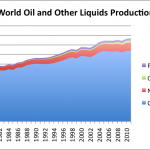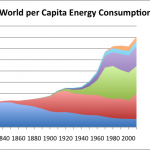Peak Oil
Peak Oil is a controversial concept. Some people actually think that the production of oil in nature is continuous (which is a tiny bit, but hardly at all, true) so we can keep pumping oil out of the ground and it will just keep being produced by tiny microbes. But aside from that particular, and annoying, made-up controversy, "real" Peak Oil (or should I say Peak Real Oil) is still controversial. Peak Oil is defined as the moment when the maximum rate of petroleum extraction occurs, and thereafter production declines steadily, like on a bell curve. But that is, in my view, the wrong way…
There's a great interview with Chris Nelder on why oil triumphalism is mistaken, and what that means for a whole host of things, including oil prices:
P: Now what about prices? We’ve seen oil prices soar from around $40 per barrel in 2004 to $140 per barrel in 2008. And nowadays, prices in the $100 range are pretty much normal.
CN: One of the implications of peak oil is that as production starts to falter, we need much higher prices in order to sustain production. And that’s exactly what’s happened since 2005.
Another implication is that the economy would be unable to tolerate those…
Interesting about the ways climate change will impact Saudi Arabia's agriculture - already strained pretty much to the limit by inhospitable heat and drought:
The difference between ETo and precipitation indicates that there may be a loss of soil moisture by 0.181 m/year (0.042–0.236 m/year) during the period of 2011 through 2050. Increase in temperature was estimated to be 1.8–4.1 °C, which can increase agricultural water demands by 5–15 % to obtain the current level of agricultural productions. This study anticipates significant reductions in water sources, which can impose further…
Randy Udall at The Oil Drum puts shale "oil" in clear perspective:
Let's try a redneck experiment.
Winter's coming, and I'm willing to pay $1,000 to the first Coloradan who decides to heat their house with oil shale. I'll deliver it in October, free of charge.
Such an experiment would teach you a lot. First, you'd learn that there's three times more energy in a pound of split pine or recycled phone books or cattle manure or Cap'n Crunch than in a pound of oil shale.
Next, you'd learn that 85 percent of oil shale is inert mineral matter. This means that on a cold winter day you'd have to…
It is pretty simple - if oil resources are finite, how do you gauge the value of different oil uses? Ultimately, a use of oil should meet one of two simple criteria:
1. Does it reduce long term oil usage, as required by the reality of finite-ness?
2. Does it do something that nothing but oil can do?
Robert Rapier takes President Obama's reference to using oil to get off oil and expands on it in a recent column, getting right to the point with a potentially viable compromise:
So I propose a compromise where we open up some of the more promising areas to exploration, and then earmark some…
AP Wire - As it heads rapidly towards energy independence, the US has been dubbed "The New Middle East" by Energy Department officials, hoping desperately that it will be true. Slightly rising oil production, a lot of shuffling paper around to make "liquids" look like oil, and a new policy of fostering internal discord and violence will, hopefully, make overblown claims about our energy situation slightly more plausible.
After years of merely rhetorically presenting itself as the "Saudi Arabia of Coal and/or Natural Gas," the US Department of Energy announced a new,…
I was asked this by a friend recently, and it has been stuck in my head (even though the whole idea requires an egomaniacal suspension of disbelief) - "If you could sit down to dinner with the people you think see the world we're in most clearly and spend dinner working on how to change things and be ready for a crisis, who would you invite to eat with you?" He added the caveat that I can have as many people as I want, and no, I don't have to cook and clean up ;-).
Actually, if I were going to do this, I would love to host. I like nothing better than to be the one doing the…
I somehow forgot to draw your attention to Kurt Cobb's wonderful essay on the difference between oil and "liquids" - he does a better job than anyone I know in making clear what most Americans simply don't know about our energy - all liquid fuels are not equivalent. We have been told by implication that they are, and most people are not technically literate enough about oil and energy issues to understand the difference, so it looks like there's plenty of oil - but of course, this isn't oil at all. We could just as easily call it "oil."
But first, an important…
Let us begin with the clear statement that asking whether you have to believe in climate change in no way alters the fundamental scientific consensus, or the tens of thousands of peer reviewed papers. I personally think the evidence for anthropogenic climate change is very clear. But that doesn't change the fact that global warming at this point is viewed as an ideological issue, rather than scientific one, and that many people do not believe that it exists, or that humans cause it. In fact, while recent extreme weather has shifted the culture somewhat, it seems safe to say…
I can't really blame George Monbiot or anyone else for buying the narrative hype. Right now the overwhelming narrative is that we have no energy constraints at all. Folks wonder aloud whether the US should join OPEC. Increasingly ridiculous projections are made about the potential of shale oil and new drilling techniques. Slight upticks are assumed to be headed to their logical extremes, and Harvard's Kennedy School of Government issues a report saying we've got all the oil we could ever want. So is it really surprising that Monbiot, who has been…
The Astrophysicist, when he has time, will have something to say about his reading of the physics of the material Tom Whipple sums up.
This situation however seems to be changing following a lengthy interview with a fellow out in Berkeley, California by the name of Robert Godes of Brillouin Energy. He has been working in this field for the last ten years and says that he not only has a reliable heat-producing device, but also understands the physics behind it - which he calls the Quantum Fusion Hypothesis. He says that this theory of just how low-energy nuclear reactions work has allowed…
The EIA, unlike the IEA, has been strident in its dismissal of peak oil. But the data that the EIA publishes tells a very different story than the one it wants us to hear. Gail the Actuary has a really good analysis up at the Oil Drum.. The essential message - that crude oil production remains basically flat, as it has since 2005, and that growth in non-crude "liquids" (all those things that have made up for the lack of crude growth in world demand) aren't growing as fast as desired or predicted.
Among the critical takeways - that unconventional oil production probably will cease to keep…
I would like to create more oil. Specifically, I'd like to create it up on my field - a gusher of light, sweet crude would be just the thing to fund my farming habit, plus provide some neat little tax benefits. Rural upstate New York has a sad lack of oil fields, and given its recession-prone economy, I think it would be just the place for some oil.
Fortunately, all I have to do, according to Forbes Magazine, is help along the development of new technologies that will extract all the oil that I'd like upstate New York to have. Because, of course as any dimwit knows, we don't consume…
The always-thoughtful Gail Tverberg has a great post that simply shows in visual terms the history of world energy consumption - well worth a look. I've reproduced one of her graphs here, but please read the whole thing.
One graph not in her post (not suggesting it should be, but I like the contrast) is world discovery of oil over about the same period - anyone who implicitly believes we are discovering vast reserves should contrast the two:
(Source, Colin Campbell)
Gail goes on to write about how an economist might be misled by past trends to disregard "facts in the ground" - lack of…
I wrote this for Dr, Seuss's 105th birthday, and thought it was worth posting (a bit belatedly) for his 108th.
I once read an incredibly entertaining literary critical analysis of _The Cat in the Hat_ which began from the premise that all the action in TCITH is an attempt to fill up the overwhelming absence of the mother from the scene. She has "gone out for the day" leaving her children untended, something she clearly is in the habit of doing, since there's a sequel with the same issue embedded. The glimpses we get of "mother's new gown" and her empty bedstead stand in implicit reference…
What I think is most important about the Nature article (unfortunately behind a paywall - Energy Bulletin has a summary here) is that part of its underlying presence is that it is possible to make major changes in the use of fossil fuels on the peak oil issue in ways it is not possible to make those changes due to the politically charged nature of climate change.
The authors, James Murray and David King, confirm what geologists involved with peak oil have known for a long time - that reserve estimates are unreliable at best, and that the science behind oil peaks is both clear and…
If you have followed energy issues from anywhere other than a cave on a mountain peak, you've probably heard technoutopians utter some variation on the following sentence two or three hundred times "We walked on the moon - of course we can do whatever it takes to shift from fossil fuels to some other source of energy." The moon shot is perceived as the ultimate example of "put in a quarter and get out the technological outcome you want" in our history. If we could set out to put a man on the moon and do it in less than decade, can't we do anything we want to, with just enough ingenuity?…
If you aren't familiar with the Export Land Model for oil, you should be - I've posted about Jeffrey Brown's incredibly important work many times in the past, but it is still common for even people who otherwise grasp the basic points of peak oil to not thoroughly understand that internal consumption dramatically affects potential decline rates.
In the simplest terms, oil exporting nations are also nations with oil money coming in and that creates economic growth and modernization that encourages domestic oil consumption. The more oil consumed internally, the less that gets exported. When…
Megan Quinn Bachman has a fabulous piece on the problem of net energy ignorance. Megan followed a group of ASPO attendees who visited congressional offices to talk about peak oil, and found pretty much what you'd expect - but what you'd expect has serious consequences:
During our congressional briefings, it felt like we were the ones slamming our heads against the wall. We were told that:
-Ethanol could free America from its dependence upon foreign oil (while at the conference chemical engineer and energy analyst Robert Rapier noted that turning all arable land in the world into biofuels…
Sadly, he's not alone, which is why this is worth debunking. Gingrich's sense that oil fields can be brought rapidly online, and his "we beat the Nazis and went to the moon so we can do this" statements reflect the general cultural misunderstandings about how oil is extracted that are endemic in our culture. While his claim that we could "open up enough oil fields in the next year that the price of oil worldwide would collapse. Now, that's what we would do if we were a serious country." is a bit of idiocy, it probably isn't atypical idiocy in a country that knows nothing about the basic…



